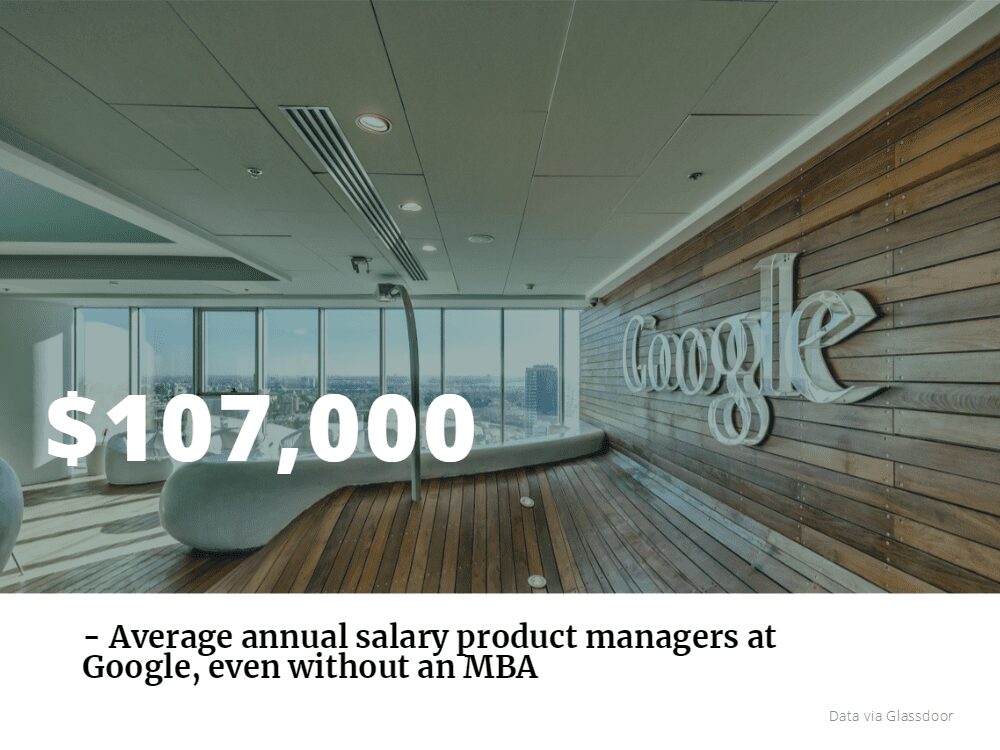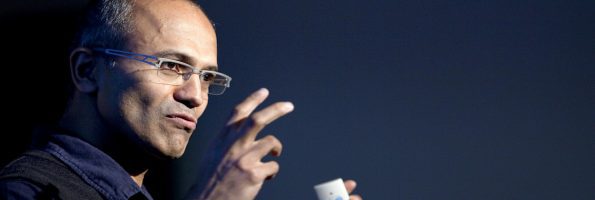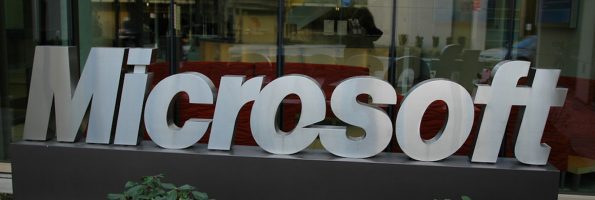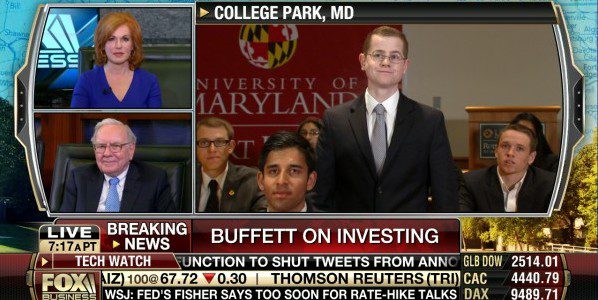Top MBA Recruiters: Microsoft vs. Google

Microsoft and Google are two brands that are practically synonymous in tech. Google provides search and email services to billions, while Microsoft’s Office is a ubiquitous presence across college campuses and cubicles around the world.
Both companies have long been top destinations in tech but their reputation is rapidly growing within the business world as well. MBAs looking to enter tech may find their dream job at one of these companies.
Microsoft vs. Google: MBA Salaries
Both Microsoft and Google, unsurprisingly, compensate their employees handsomely. Given the numerous opportunities MBA graduates might have due to their past experience and interests, we will will examine only one position: Project Manager, a common entry-level position for many new MBAs.
According to Glassdoor, project managers at Microsoft earn an average annual salary of $96,520, which can rise sharply for MBAs. Average additional play, include cash bonuses, stock shares, and more, can increase the annual sum by a measure of $20,000.
At Google, project managers typically earn a bit more per year, with a current estimate around $107,000. With bonus and stock incentives, that can increase that figure by a measure of $40,000 or more per year.

Microsoft vs. Google: Company Culture
Google has one of the most infamous company cultures in the tech world. Aside from the well-known benefits of working at a Google campus, Google operates according to a philosophy; Ten things we know to be true. This document drives all of the work that the company does. It also influences who they choose to employ at their company.
In terms of office life, Google is extremely relaxed. Employees work hard, but they are given the space to do so in their own idiosyncratic ways. Employees are encouraged to be creative by working across departments to develop new products and come up with solutions.
In the past, Microsoft was a place known for its ruthless culture. Spearheaded by founder Bill Gates, Microsoft demanded a lot from its employees and cultivated a hostile workplace. Under the leadership of Satya Nadella, however, Microsoft encourages a growth mindset. This new attitude allows employees to learn from one another, as well as Microsoft customers.
Microsoft’s new approach to work has transformed the workplace as well. Rather than working employees like dogs, Microsoft now encourages its employees to maintain a work-life balance. In addition, the office has been opened, providing more spaces for collaboration and communication.

Microsoft has disconnected from its reputation as a rough employer, creating an inviting, fun culture of inclusivity and modernity / Photo via Scott Eklund/Red Box Pictures
Microsoft vs. Google: Employee Numbers
Operating at the forefront of innovation, Google and Microsoft are two of the largest employers in the technology sector. Google employs over 98,000 employees, while Microsoft has almost 135,000 employees.
Many of Google’s employees are centered at the Googleplex in Mountain View, California. The remainder are spread across more than 70 offices in 50 countries. Microsoft has 50,294 employees in its home region around the Puget Sound. The remaining employees are located in 646 office sites spread across 109 countries.
Microsoft vs. Google: Employee Satisfaction
Google and Microsoft offer generous benefits and make themselves accessible to address any employees concerns that may arise.
Both companies are ranked highly on lists of the best places to work. Google is eighth on Glassdoor’s “Best Places to Work” list for 2019, a list voted on by the employees at the companies themselves. Microsoft is ranked 34th on the Glassdoor list.
The business world has recognized the efforts of both companies to push innovation and creativity. Comparably.com surveyed employees and wrote a list of the companies with the brightest outlook—Google ranked 10th on this list and Microsoft ranked 12th.
Alumni Spotlight: Microsoft CEO Satya Nadella – University of Chicago Booth School of Business

Once a ferocious beast in the kingdom of tech with massive product launches and Antitrust sagas, it could be argued that Microsoft has spent the first two decades of the 21st century in search of solid ground. The Steve Balmer era, which focused on “devices and services,” brought us the Xbox, the Surface, and the acquisitions of Skype and Linkedin. Wired posits that the fall of Microsoft “stems from its attempts to lock users into its products by refusing to work with competitors,” coupled with a series of “me-too hardware products,” like the Zune and the Kin. There’s also Bing and MSN, which are practically non-entities compared to their competition.
In the last three years, CEO Satya Nadella has been a relevatory savior for the company, spearheading a massive pivot away away from hardware and toward cloud computing and AI. So far, so good. Company shares reached record highs since 1999 and its cloud is valued at a $14 billion annual run rate, which places Microsoft neck and neck with Amazon Web Services, if you include Microsoft Office 365. That said, Nadella remains unphased by the numbers, as he tells the Economist, “When you have a core that’s growing at more than 20 percent, that is when the rot really sets in.”
Let’s take a deeper dive to find out more about Nadella’s past, present, and future.
Learning at Chicago Booth
Nadella’s tenure at Microsoft is inextricably linked with his University of Chicago Booth School of Business education. In fact he started both at the exact same time, in 1992. Instead of opting out of one for the other, he enrolled in Booth’s Weekend MBA program and flew from Seattle to Chicago every weekend for two-and-a-half years.
Nadella believes his Booth MBA was instrumental in giving him the “knowledge and confidence to tackle complex questions at the intersection of business and technology,” according to a UChicago profile. Nadella cites Steven Kaplan’s entrepreneurial finance class as particularly influential on his ability to “evaluate new business opportunities at Microsoft.” On Nadella, Kaplan spoke highly: “He can take a situation and analyze and articulate the issues involved. He can both write well and understand the case quantitatively.”
Wired traces Nadella’s “clarity of vision and empathetic listening style” to his firstborn son Zain’s cerebral palsy, which helped Nadella “see beyond himself and compelled him to force-rank his daily priorities so that he could meet his son’s needs and still perform his job—the same skill so necessary to effective management.” He tells Wired:
“I think back to how I thought about work before and after, and this notion of the words you say and what they can do to the other person. How can you really change the energy around you? It’s a thing that started building in me, and I started exercising it in my day job. It made a lot of difference to how I felt when I went back home. So much of it is mental attitude.”
Early Days at Microsoft
In 2015, Nadella told UChicago Booth Magazine, “Having grown up in the company, what is it 23 years or so, I always come back to the very first thing Microsoft did, the BASIC interpreter. It was this notion of empowering others to do great things.”
Nadella progressed quickly through company ranks. His first major notch on his belt was Windows NT but played significant technical roles in Bing, MSN, and Microsoft’s advertising systems. UChicago Booth Magazine pinpoints Nadella’s real contribution to the company during his tenure of Executive VP of cloud and enterprise businesses.
“At Microsoft, Nadella is navigating a rapidly shifting technology landscape, in which customers have been moving away from traditional desktop computers, toward nimbler mobile platforms such as tablets and smartphones.” Nadella says, “The only way you’re going to have that mobility of the human experience—not the device—is by having cloud orchestrate the movement.”
CEO
When the Nadella era began, he publicly invoked Nietzsche when he said Microsoft must have “courage in the face of reality,” according to Wired. His approach to steering Microsoft is nothing if not rooted in reality. Wired compared his Microsoft strategy to those of “the Silicon Valley startups that have eclipsed it” in which the change is cultural, not just organizational. The Economist writes that Microsoft is much more of a “full stack” firm, in which it “not only writes all kinds of software, but builds its own data centers and designs its own hardware.”
Nadella tells UChicago Booth Magazine, “My vision is to take that productivity and empowerment of individuals and organizations and express it in this new world, which is mobile-first, cloud-first.”
Nadella jettisoned the company’s R&D process in favor of a more transparent, open-ended model, which is perhaps in response to such New Coke-style abominations as the Microsoft Courier. He encourages execs to work with people outside their divisions, whose lines of demarcation have become increasingly ambiguous.
He’s pushing engineers and researchers from disparate parts of Microsoft to work more closely together—even wrangling Bill Gates back into the saddle as a part-time technical adviser to motivate his team. “When I say, ‘Hey, I want you to go run this by Bill,’ I know they’re going to do their best job prepping for it,” he tells Wired. Nadella described Microsoft’s Skype Translator, which offers real-time translation of multilingual chats, as the apotheosis of his cooperative company-wide strategy.
The Future
Nadella tells UChicago Booth that his overarching vision for Microsoft is to adapt to the dialogue between culture and technology but to push for a more productive, harmonious conversation. In March, Nadella shared his vision for a new “platform-neutral” Microsoft with the announcement that the company would soon launch Word, Excel, and PowerPoint editions for the iPad.
“Technology has always led us to have better lives [but] you can measure whether you’re doing anything useful. Do you feel a little stretched? If not, there’s something wrong.”
Rotman Management Magazine Celebrates 10 Years

Since 2007, the Rotman School of Management at the University of Toronto has provided thought leadership and management insight in the form of the Rotman Management magazine. Now, with its thirtieth issue out this spring, the magazine is celebrating ten years of bringing readers insightful articles and topics from experts in the areas of business, economics, psychology, design thinking and more. Continue reading…
Top MBA Recruiters: Microsoft

Past, present and future business school students lured by the siren song of the tech industry should look no further than Microsoft, the $407 billion semi-benevolent techno giant that employs nearly 100,000 from its Redmond, Washington headquarters.
Continue reading…
Decline of the Unicorns (A Startup Tale)

In advance of his upcoming course, ‘How to Finance and Grow Your Startup – Without VC,’ set to start 12 April 2016, London Business School’s blog recently spoke with Management Practice in Marketing and Entrepreneurship Professor John Mullins to gain insight into why we are starting to see a sharp decline in the value of so-called “unicorn” start-ups.
Continue reading…
B-School Students Question Buffett, Gates and Munger On Live Telecast

Not just anybody is given the title of Oracle.
Superstitions aside, to become known as a wizard, sage or fortuneteller is a sign of wisdom and great respect. Warren Buffett, Chairmen and CEO of Berkshire Hathaway, could be considered a fortuneteller— he earned his nickname, the Oracle of Omaha, by becoming known as one of the most successful investors of the 20th century.
And if Buffett is the Oracle, then Bill Gates and Charlie Munger would be two of his wise men— together, this Holy Trinity of Billionaires and Berkshire Hathaway chairmen sat down with Fox Business Network’s Liz Claman during the annual BH Meeting in Omaha, Nebraska. They fielded questions from graduate students representing New York University’s Stern School of Business, University of Chicago’s Booth School of Business and University of Maryland’s Robert H. Smith School of Business. Continue reading…
